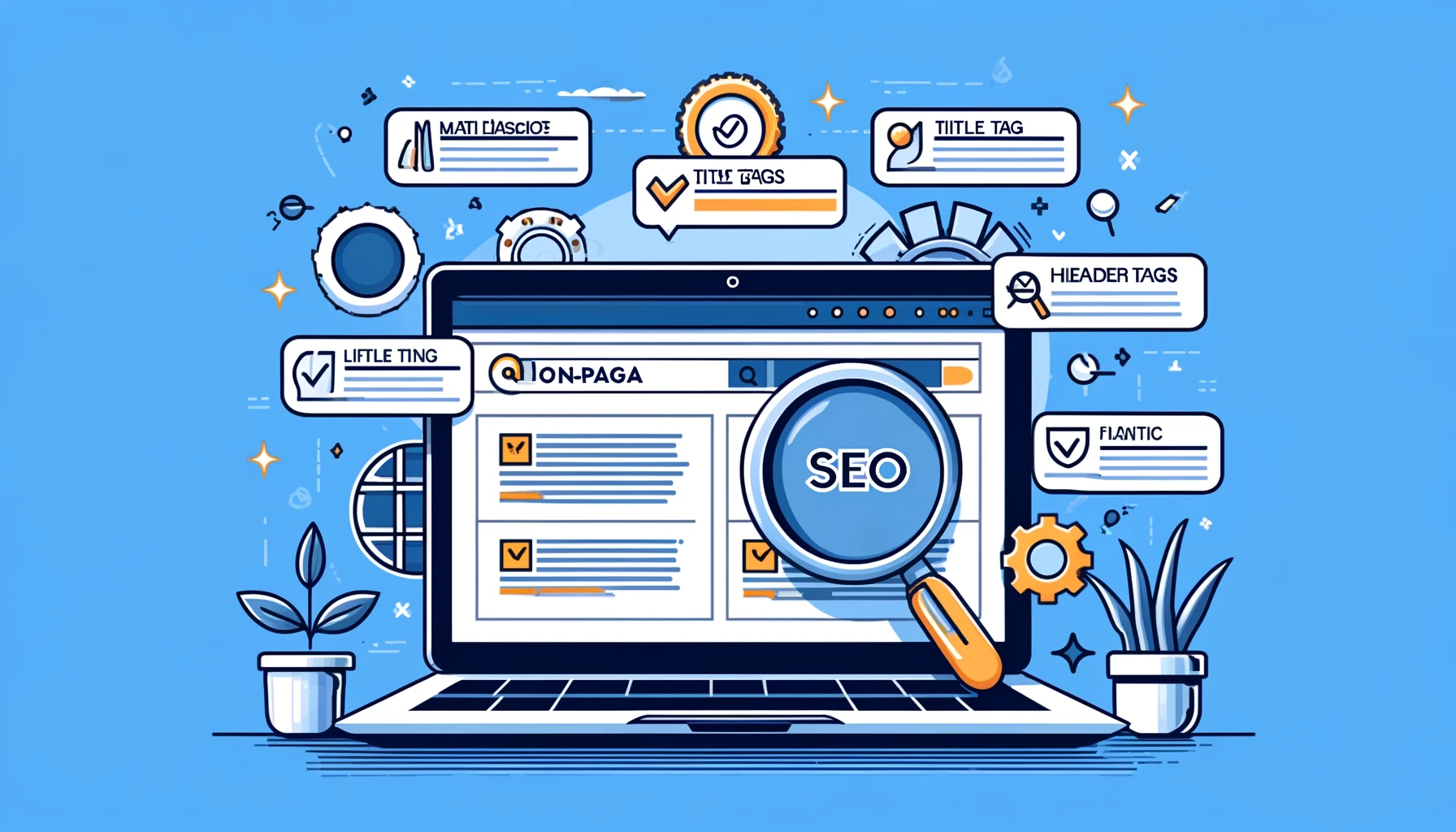Discover simple SEO strategies for enhancing online visibility. Learn how small businesses can improve their presence with easy and effective SEO strategies for visibility and growth.
Key Takeaways
- Focus on Keyword Research: Understand the words and phrases your audience uses.
- Optimize On-Page Elements: Ensure your website content is clear and relevant.
- Create Quality Content: Provide valuable information to your audience.
- Leverage Local SEO: Use local strategies to attract nearby customers.
- Build Backlinks: Gain links from reputable sites to improve credibility.
Table of Contents
Introduction
Boosting your business’s online presence doesn’t have to be overwhelming or complicated. In today’s digital landscape, a solid search engine optimization (SEO) strategy is essential for enhancing your website’s visibility. However, many small business owners find SEO to be daunting and time-consuming.
The good news is, you don’t need to be an SEO expert to see significant improvements in your online visibility. By focusing on a few simple SEO strategies, you can make a big impact with minimal effort.
In this blog post, we’ll dive into easy-to-understand and actionable SEO tips tailored for small businesses. You’ll learn how to target the right keywords, optimize your website, create valuable content, and more, all while keeping things straightforward and manageable. Whether you’re new to SEO or looking to refine your existing strategies, this guide will provide you with the insights you need to stand out online.
Focus on Keyword Research
One of the most fundamental elements of effective SEO is understanding the words and phrases your potential customers use when searching online. By targeting the right keywords, you can align your content with what your audience is looking for, leading to better visibility and engagement.
Understanding Keywords
Keywords are the terms people type into search engines to find what they’re looking for. For small businesses, it’s crucial to identify keywords relevant to your products or services. Think about what your customers might search for when seeking out your business. These keywords should be closely related to what you offer, providing a bridge between potential customers and your business.
- Types of Keywords: There are two main types of keywords: short-tail and long-tail. Short-tail keywords are broad and general, like “bakery” or “shoes.” Long-tail keywords are more specific, like “gluten-free bakery near me” or “red running shoes for women.”
Using Long-Tail Keywords
Long-tail keywords are particularly beneficial for small businesses because they tend to have less competition and are more specific to user intent.
- Why Long-Tail Matters: Long-tail keywords often reflect more detailed searches, meaning the searcher has a clear idea of what they want. By targeting these specific terms, you can attract highly targeted traffic to your website, increasing the likelihood of conversions.
- Finding Long-Tail Keywords: Tools like Google’s Keyword Planner or Ahrefs can help you discover relevant long-tail keywords. Think about the unique aspects of your business or offerings that potential customers might be searching for.
Optimize On-Page Elements

Meta Descriptions
Meta descriptions are the brief snippets that appear under your website’s title in search engine results. Although they don’t directly impact rankings, they play a significant role in click-through rates.
- Crafting Effective Meta Descriptions: Your meta descriptions should be clear, concise, and include relevant keywords. Aim for around 150 to 160 characters. These descriptions should accurately represent the content on the page and entice users to click through to your site.
Title Tags
Title tags are the clickable headlines in search engine results. They are a key on-page factor for SEO and play a major role in influencing both search engine rankings and user behavior.
- Optimizing Title Tags: Keep your title tags between 50 to 60 characters and include your main keyword towards the beginning. Ensure that each page on your site has a unique title tag that accurately reflects its content.
Header Tags
Header tags (H1, H2, H3, etc.) structure the content on your website, making it easier for search engines and users to understand.
- Using Header Tags: Your page should have one H1 tag, which is usually the main title of the page, and several subheadings (H2, H3, etc.) that organize the content. Use your main keyword in the H1 tag and related keywords in the subheadings to improve SEO.
Create Quality Content
Creating high-quality, relevant content is crucial for effective SEO. Not only does it provide value to your audience, but it also helps search engines understand what your site is about.
Blogging for SEO
Blogging is an excellent way to create fresh, valuable content that targets specific keywords and engages your audience.
- Creating Valuable Blog Posts: When writing blog posts, focus on providing useful information that addresses your audience’s needs or answers their questions. Incorporate your target keywords naturally within the content and use engaging headlines and subheadings.
Video Content
Video content is becoming increasingly important for SEO. It keeps visitors engaged and can also improve your search engine rankings.
- Using Video for SEO: Create videos that provide valuable information or showcase your products and services. Optimize the video title, description, and tags with relevant keywords to enhance visibility.
Leverage Local SEO
For small businesses, local SEO is crucial for attracting customers in your area.
Local Listings
Creating and optimizing local listings, such as Google My Business, can significantly improve your local search visibility.
- Setting Up Local Listings: Ensure that your business information (name, address, phone number) is consistent across all listings. Include relevant keywords and categories, and encourage satisfied customers to leave positive reviews.
Reviews and Ratings
Online reviews and ratings influence potential customers and can improve your local SEO.
- Encouraging Reviews: Provide excellent service and encourage happy customers to leave positive reviews. Respond to reviews, both positive and negative, to show that you value customer feedback.
Build Backlinks

Backlinks are links from other websites to yours. They serve as “votes of confidence” for your site, indicating its credibility and relevance.
Guest Blogging
Guest blogging on reputable sites can help you build backlinks and increase your exposure.
- Writing Guest Posts: Reach out to relevant blogs or websites and offer to write a guest post. Include a link back to your site within the content or author bio to improve your SEO.
Directories
Listing your business in online directories can improve your SEO and increase your visibility.
- Listing in Directories: Choose reputable directories related to your industry or location. Ensure your business information is accurate and consistent across all listings.
Conclusion
By focusing on these simple SEO strategies, small businesses can enhance their online visibility and attract more potential customers. Whether you’re targeting the right keywords, optimizing on-page elements, creating quality content, leveraging local SEO, or building backlinks, these straightforward tips can make a big difference in your online presence.
FAQs
What are simple SEO strategies for enhancing online visibility?
Simple SEO strategies include focusing on keyword research, optimizing on-page elements, creating quality content, leveraging local SEO, and building backlinks.
How can small businesses improve their SEO with minimal effort?
Small businesses can improve their SEO by targeting long-tail keywords, optimizing meta descriptions and title tags, creating valuable blog posts, setting up local listings, and encouraging positive reviews.
What are effective SEO tips for small business owners?
Effective SEO tips for small business owners include understanding their audience’s search behavior, optimizing their website’s on-page elements, regularly creating quality content, utilizing local SEO, and building backlinks from reputable sites.
How important is content in SEO?
Content is crucial for SEO because it provides value to the audience and helps search engines understand the relevance and quality of a website. High-quality content can improve search engine rankings and increase user engagement.
How does local SEO help small businesses?
Local SEO helps small businesses by improving their visibility in local search results, attracting nearby customers, and enhancing their reputation through online reviews and local listings.
